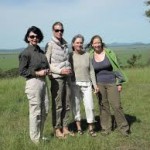How to book?
Learn how to book a safari trip: Tour Enquiry & Holiday Bookings
In order to book a safari with ANAPA Travel Tanzania Ltd follow these simple steps:
1. Browse to any Tanzania safari itinerary under the safari trips menu at the top,
2. Click on any safari that suits your budget or number of days FOR THE TOUR
3. Go through the full itinerary in order to note if there are some points that can be adjusted to suit your dream safari
4. Click the “Send inquiry of this Safari” button that looks like this
5. Enter your required details then submit and wait for a reply from our dedicated team.
Subsequently you can fill out this Online booking form to tailor make your custom safari holidays or email us at info@anapatravel.com and tell us what you are interested in.
Let us know the following:
· The month you are interested experiencing the dream come true
· The length of time you will want to enjoy your safari
· Number of people who will share this life experience with you
· Style of Accommodation you would like to use during your trip( Luxury Hotel, Comfort Hotel, or Easy ) – you just mention what and we will arrange it for you
· Any special requests you have for your wildlife safari
Create you safari plan, then book.
Together we will create your safari as you want it to be. The safari plan will accommodate your interests and time schedule. We enjoy talking to you about your trip, so please provide us with your phone number.
Once you have agreed to our safari proposal:
- Get your travel dates fixed:
This will give us chance to start checking the availability of the accommodations of your choice. Traveling from/to the Americas and Asia takes about 2 days; from most of Europe, one day.
- Confirm your Safari with us:
We will start booking the lodges and camps of choice for your safari. Once we have all the lodges confirmed then you can pay the deposit.
- Place a deposit with us:
Once we have confirmed the lodges and activities of your choice, a deposit of 30% is required. The deposit can be made by wire transfer to our bank, by certified check, Visa, MasterCard, American Express or PayPal. Your other payments will be specified in the safari plan we will send you – generally at 90 and 45 days before the start of your safari.
Once we have a confirmed itinerary for you and us to work from, you should make your international travel reservations. We also strongly recommend that you obtain adequate travel insurance to protect you against any unforeseen problems.
Following the receipt of your deposit, we will send you a package containing: your confirmed itinerary, acknowledgement of your deposit, and information about safaris and how to prepare for your adventure. We will also provide contact telephone numbers for you to leave with family or friends to use should they need to reach you while on safari.
What to pack for safari
Clothing:
 The weather in Tanzania can range from 10-23°C depending on the time of year. It is advisable to pack for both hot and cold weather outcomes, so taking a warm fleece and pair of long trousers is advised as well as plenty of t-shirts, shorts and a large hat that covers your head and face from the sun. If you are planning on going on safari, try to stick to earthy colours – browns, beiges, greens and khakis – or you may attract a little too much attention from the animals! Short sleeve shirts, t-shirts, shorts and trousers are ideal. Women can wear shorts and skirts out on safari, but should dress more conservatively in predominantly Muslim areas. Don’t worry though ladies – swimwear is perfectly acceptable on the beach and in hotel grounds.
The weather in Tanzania can range from 10-23°C depending on the time of year. It is advisable to pack for both hot and cold weather outcomes, so taking a warm fleece and pair of long trousers is advised as well as plenty of t-shirts, shorts and a large hat that covers your head and face from the sun. If you are planning on going on safari, try to stick to earthy colours – browns, beiges, greens and khakis – or you may attract a little too much attention from the animals! Short sleeve shirts, t-shirts, shorts and trousers are ideal. Women can wear shorts and skirts out on safari, but should dress more conservatively in predominantly Muslim areas. Don’t worry though ladies – swimwear is perfectly acceptable on the beach and in hotel grounds.
Electricity:
 Plugs in East Africa are flat three-pin, just like the UK model. Make sure you have the right adapter, if necessary, for charging any electrical devices you bring (for example your camera…you’ll definitely want to take some photos!) The voltage is 220 / 240 AC.
Plugs in East Africa are flat three-pin, just like the UK model. Make sure you have the right adapter, if necessary, for charging any electrical devices you bring (for example your camera…you’ll definitely want to take some photos!) The voltage is 220 / 240 AC.
We strongly recommend that you bring a small torch, as power cuts are more frequent in this part of the world! Don’t worry too much, as most lodges and hotels have back-up generators and candles for this very reason.
Safari Glossary
You may come across many words that are new to you whilst searching for information about African wildlife safaris. To help you learn the safari lingo, we have put together a glossary of some of the most common phrases that are used to describe safaris, wildlife characteristics and environment types.
Safari
Is a Swahili word which translates to ‘journey’. Safaris are generally a trip around a wildlife reserve spotting animals.
Private Safari
Many tour operators place random groups of people into the same vehicle to fill it up and cut costs. However, a private safari means that you have your own vehicle and driver/guide regardless of how many people are in your group.
Custom Safari
The ability to create your own itinerary of safari locations and hotels tailored to your exact needs and requirements.
Walking safari
Many reserves with low predator counts offer walking safaris. You will be led through the area by an expert guide to meet the wildlife on its level.
Balloon safari
A soaring wildlife experience from the great heights of a hot air balloon, a great way to see a parks surrounding scenery.
Horse riding safari
A safari that is conducted on horseback.
Motorbike safari
An adrenaline pumping tour that is carried out on a motorbike.
Sanctuary
A place that cares for and feeds injured or incompetent of surviving animals.
Conservancy
An organisation that’s sole mission is to preserve the wildlife, environment and natural resources.
Early morning Game Drive
A safari that is taken at dawn to catch the day time wildlife waking up and the night time wildlife heading home to give a greater chance of sightings.
National Park
A National Park is land owned, preserved and maintained by the government which is public property.
Game Reserve
A Game Reserve is a location created for tourism and in some cases, game hunting is allowed.
National Reserve
A National Reserve is similar to a National Park, but is focused to preserve the inhabitancy of humans as well as wildlife.
Plains
This is a piece of land that is generally flat and is mostly covered by grass.
Plains game
This term is used to generalise fair-game species of gazelle and antelope that are found in open plains
Watering hole
A water source that is used by a large variety of animals to hydrate.
Savannah
This means that the area has trees that well spaced out from each other.
Montane Forest
A tropical forest that is fogged over due to cloud mist.
Nocturnal
Wildlife that only hunts and lives at night time.
Diurnal
Animals that hunt and live in the day light hours.
Grazers
Animals that only eat plants and trees such as grass.
Predators
Meat eating animals that hunt and rely on killing and eating other animals, generally grazers as their main food source.
Prey
An animal that is hunted for food.
Ungulates
Animals that walk on hooves.
Hope to meet you and serve you while in Africa…!!

